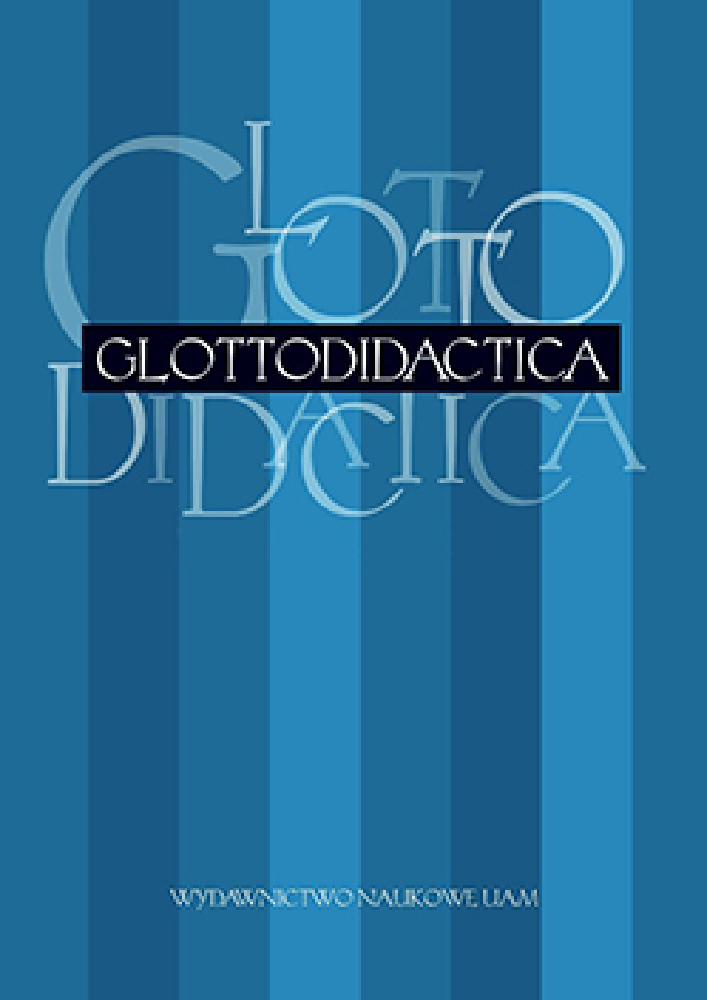Abstract
The aim of this article is to present the project of a contrastive Polish-German and Russian-German grammar, which arose as a result of the cooperation between Samara State University of Social Sciences and Education and Adam Mickiewicz University in Poznan. The idea of a unilateral grammar which is based on the categories of the mother tongue of the learner and is aimed at the foreign language to be learned, is designed as a suitable measure within the framework of error prevention. The grammar contains selected grammatical categories that are significant sources of errors for native Slavic speakers
References
Averina, A. V. / Kostrova, O. A. (2019). Grammatika nemeckogo jazyka. Moskau: JUrajt (na nemeckom jazyke).
Bimmel, P. / Rampillon, U. (2000). Lernerautonomie und Lernstrategien. München: Langenscheidt.
Boski, P. (2003). Polen. In: A. Thomas / S. Kammelhuber / S. Schroll-Machl (Hrsg.). Handbuch Interkulturelle Kommunikation und Kooperation. Bd. 2: Länder, Kulturen und interkulturelle Berufstätigkeit (S. 122–133). Göttingen: Vandenhoeck & Ruprecht.
Duden (2007). Das große Fremdwörterbuch. Herkunft und Bedeutung der Fremdwörter. Stichwort: Lapsologie. 4. aktualisierte Auflage. München / Lepzig / Wien / Zürich: Dudenverlag.
Engel, U. et al. (2000). Deutsch-polnische kontrastive Grammatik. 2 Bände. Warszawa: Wydawnictwo Naukowe PWN.
Fandrich, C. / Thurmair, M. (2018). Grammatik im Fach Deutsch als Fremd- und Zweitsprache. Grundlagen und Vermittlung. Berlin: Erich Schmidt Verlag.
Grimm, H.-J. (1986). Untersuchungen zum Artikelgebrauch im Deutschen. Liepzig: VEB Verlag Enzyklopädie.
Grucza, F. (1993). Zagadnienia ontologii lingwistycznej: O językach ludzkich i ich (rzeczywistym) istnieniu. In: J. Bartmiński (Hrsg.). Opuscula Logopedica in Honorem Leonis Kaczmarek (S. 25–47). Lublin: UMCS.
Grucza, F. (1997). Języki ludzkie a wyrażenia językowe, wiedza a informacja, mózg a umysł ludzki. In: F. Grucza / A. Dakowska (Hrsg.). Podejście kognitywne w lingwistyce, translatoryce i glottodydaktyce (S. 7–21). Warszawa: WUW.
Helbig, G. / Buscha, J. (1972). Deutsche Grammatik: Ein Handbuch für den Ausländerunterricht. Leipzig: VEB Verlag Technik.
Kantorczyk, U. / Komorowska, E. / Lysakova, I. / Veselovskaja, T. (2008). Pragmatik von Aufforderungshandlungen im Deutschen, Polnischen und Russischen. Szczecin / Rostock: Print Group sp. z o.o.
Kashkin, V. B. (2001). Funkcionalnaja tipologija (Neopredelennyj artikl). Voronezh: VGTU.
Kieweg, W. (2007). Fehler erkennen – Fehler vermeiden. Der fremdsprachliche Unterricht Englisch 41 (88): Fehlerbewußtes Lernen, 2–11.
Kostrova, O. A. (2019). Strategii sozdaniya aspektualno-determinativnogo ravnovesiya v nemeckom i russkom yazykah. Voprosy kognitivnoj lingvistiki, 3, 72–84. DOI: https://doi.org/10.20916/1812-3228-2019-3-72-84
Kostrova, O. A. / Prokop, I. (2019). Erklärende deutsche Grammatik für slawische Muttersprachler. GERMANISTIKA Nove et nova: Materialy Mieżdunarodnoj nauchno-prakticheskoj konferencji. 10–12 aprelja. 2019 g. Мoskva, 211–214. https://linguanet.ru/upload/medialibrary/d27/d27afbe447937cb2202bd80bb82cfa5a.pdf [Zugriff am: 12.03.2020].
Krasukhin, K. G. (1997). Tri modeli indoevropejskogo vremeni na materiale leksiki i grammatiki. In: N.D. Arutyunova / T.E. Yanko (Hrsg.). Logicheskij analiz jazyka. Jazyk i vremja (S. 62–77). M.: „Indrik“: Rossijskaja Akademija Nauk.
Kroschewski, A. (2000). „False friends“ und „true friends“. Ein Beitrag zur Klassifizierung des Phänomens der intersprachlich-heterogenen Referenz und zu deren fremdsprachendidaktischen Implikationen. Frankfurt am Main: Peter Lang.
Leiss, E. (2000). Artikel und Aspekt. Die grammatischen Muster von Definitheit. Berlin et al.: De Gruyter. Lipczuk, R. / Mecner, P. / Westphal, W. (2000). Lexikon der modernen Linguistik. Ausgewählte Begriffe zur Kommunikation und Kognitionswissenschaft. 2.erweiterte Ausgabe. Szczecin: Wydawnictwo Promocyjne Albatros. DOI: https://doi.org/10.1515/9783110825961
Schroll-Machl, S. (2003). Deutschland. In: A. Thomas / S. Kammelhuber / S. Schroll-Machl (Hrsg.). Handbuch Interkulturelle Kommunikation und Kooperation. Bd. 2: Länder, Kulturen und interkulturelle Berufstätigkeit (S. 72–89). Göttingen: Vandenhoeck & Ruprecht.
Schroll-Machl, S. (2003). Russland. In: A. Thomas / S. Kammelhuber / S. Schroll-Machl (Hrsg.). Handbuch Interkulturelle Kommunikation und Kooperation. Bd. 2: Länder, Kulturen und interkulturelle Berufstätigkeit (S. 90–112). Göttingen: Vandenhoeck & Ruprecht.
Wolff, D. (2003). Lernerautonomie und selbstgesteuertes fremdsprachliches Lernen. Überblick. In: K. Bausch / K.-R. Christ / H.-J. Krumm (Hrsg.). Handbuch Fremdsprachenunterricht (S. 321–326). Tübingen / Basel: Francke.
Zabrocki, L. (1980). Grundfragen der konfrontativen Grammatik. In: L. Zabrocki (Hrsg.). U podstaw struktury i rozwoju języka. At the foundation of language structure and development (S. 254–270). Warszawa / Poznań: Państwowe Wydawnictwo Naukowe.
License
 This work is licensed under a Creative Commons Attribution-NoDerivatives 4.0 International License.
This work is licensed under a Creative Commons Attribution-NoDerivatives 4.0 International License.
Authors
Authors of texts accepted for publication in Glottodidactica are required to complete, sign and return to the Editorial team’s office the Agreement for granting a royalty-free license to works with a commitment to grant a CC sub-license.
Under the agreement, the authors of the texts published in Glottodidactica grant Adam Mickiewicz University in Poznań a non-exclusive, royalty-free license and authorize the use of Attribution-NoDerivatives 4.0 International (CC BY-ND 4.0) Creative Commons sub-license.
The authors retain the right to the free disposal of the work.
Users
Interested Internet users are entitled to use works that have been published in Glottodidactica since 2016, under the following conditions:
▪ attribution – obligation to provide, together with the distributed work, information about the authorship, title, source (link to the original work, DOI) and the license itself.
▪ no derivatives – the work must be preserved in its original form. Without the author's consent, it is not possible to distribute the modified work in the form of translations, publications, etc.
Copyrights are reserved for all texts published before 2016.
Miscellaneous
Adam Mickiewicz University in Poznań retains the property right as a whole (layout, graphic form, title, cover design, logo etc.).
Privacy statement
The names and email addresses published on this journal site will be used exclusively for the purposes declared by this journal and cannot be used for any other purpose or by any other party.





